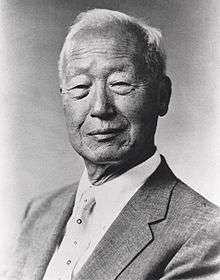Ilminism
Ilminism (Korean: 일민주의; Hanja: 一民主義; RR: Ilminjuui;), frequently translated as the One-People Principle, was the political ideology of South Korea under its first President, Syngman Rhee. The Ilmin principle has been likened by contemporary scholars to the Nazi idea of the Herrenvolk (master race), and was part of an effort to consolidate a united and obedient citizenry around Rhee's strong central leadership through appeals to nationalism and ethnic supremacy.

The concept of the One-People Principle was developed primarily by Minister of Education An Ho-sang, who studied philosophy at the University of Jena in Germany during the late 1920s.
Ideology
The One-People Principle has been likened to the German ideology of the herrenvolk (master race), constituting an effort to build a loyal and obedient citizenry through ethnic homogeneity and brazen appeals to nationalism.[1] The idea for a Korean adaptation of this Germanic idea emerged from the works of philosopher An Ho-sang, the Minister of Education under Syngman Rhee,[1] who studied at the University of Jena in Germany during the late 1920s.[2] The ideology also emphasized an importance on Confucianism and Confucian principles.[3]
The Ilmin Principle became the central ideology of Rhee's National Society and its successor, the Liberal Party, established in 1951.[1]
The One-People Principle was based around a four-point political program, including elimination of formal discrimination between the nobility and the masses, the economic equalization of rich and poor through land reform, social and political equality of the sexes, and an end to discrimination between North and South or the urban capital and the rural provinces.[1] An end to partisan politics was posited, in favor of a united people behind a de facto one-party state.[1]
The egalitarian theoretical underpinnings of the One-People Principle, heralding a classless society of gender equality under firm central leadership, proved to be utopian, with Rhee emerging in practice as head of a semi-fascist dynasty on the Japanese model, remade with Rhee in the role of an emperor.[1]
Ilminism was effective in creating a strong anti-Communist nationalism to stand in juxtaposition to the effective appeals to nationalism made through the Democratic Front for the Reunification of the Fatherland, headed by Kim Il Sung and the communist Workers' Party of Korea.[4]
See also
Footnotes
- Su-kyoung Hwang, Korea's Grievous War. Philadelphia: University of Pennsylvania Press, 2016; pg. 93.
- Vladimir Tikhonov and Pak Noja, "Social Darwinism as History and Reality: 'Competition' and 'The Weak' in Early Twentieth-Century Korea," Critical Asian Studies, vol. 48, no. 3 (2016).
- "유교적 전통과 현대 한국사회".
- Hwang, Korea's Grievous War, pg. 94.
Further reading
- Lim Jong-myoung (2005). 一民主義와 대한민국의 근대민족국가화 [One Nation Principle (Ilminjuui) and the Making of the Republic of Korea as a Modern Nation-state]. Journal of Studies on the Korean National Movement (in Korean). 44.